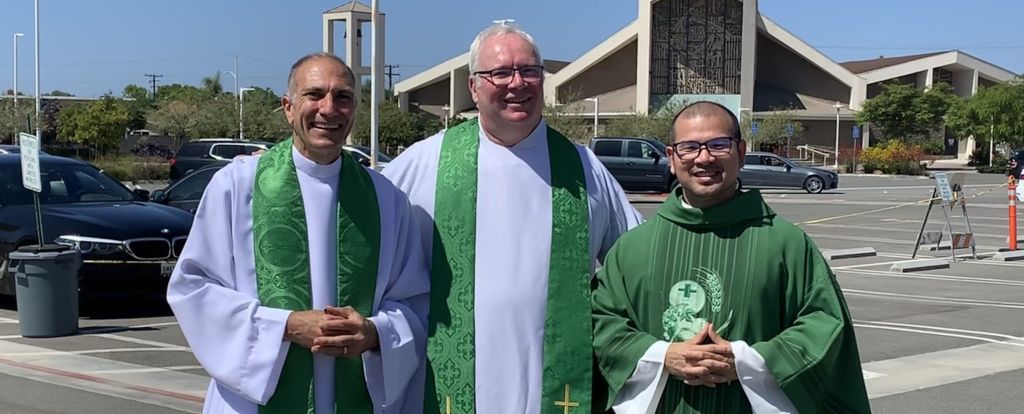
Pastoral Message – June 12, 2022
As we celebrate Trinity Sunday, I thought that it might be helpful to give you some background on our belief in the Trinity as well as our basis for that belief.
From the time of Abraham, the Jews were monotheists—they believed in and worshipped only one god. This stands out because most ancient societies were polytheistic—they believed in and worshiped multiple gods. As monotheists, the Jews struggled with the radical claims that Jesus was the “Son” of their one God and that the Holy Spirit was a “person” of that same one God. It was one thing for Jesus to claim to be the Messiah, it was quite another for Him to claim to be the Son of God, which was tantamount to saying that He was God. Similarly, while Hebrew scripture did reference the “Spirit of God,” they certainly did not see the Spirit as a separate person within the one true God. Therefore, most Jews were simply incapable of including Jesus and the Holy Spirit in their identity of God. Thus, the identity of God as a Trinity was absurd to them.
As the “chosen people,” the Jews had a very specific identity of their God who was the only eternal God who loved the whole world, but who entered into a covenant with Israel; who acted on behalf of Israel; and, who gave Israel His Law as His special gift. In fact, it was that very Law which identified the one true God and prohibited Israel from worshipping any other gods.
The earliest Christians built their faith on Jewish patterns and principles. They connected Jesus to the God of the Hebrew Scriptures and did not see how following Jesus represented a break with Jewish monotheism. Instead, they believed that Jesus could be exalted and worshipped because he fit within the Hebrew identity of the one true God of Abraham, Isaac and Jacob.
Christian understanding of the Holy Spirit was also rooted in the Jewish religion. From the creation story in Genesis, the Jews acknowledged that God breathed his spirit onto the human being of dust and transformed the dust into a living being. Similarly, Luke tells us that the spirit of God transformed an ordinary girl into the Mother of God. When Jesus went to the synagogue on the Sabbath, He read from the prophet Isaiah: “The Spirit of the Lord is upon Me.” In that moment it was clear that this Jesus of Nazareth was also the Promised One of Israel. In general, the Jewish view is that the “spirit of God” referred to in the Bible alludes to His energy.
To align Christianity with its roots in the Jewish scriptures, early Christians had to identify God as creator, ruler, the one who revealed himself to and made a covenant with Israel. There is one God – the God of Israel who created the Heavens and the Earth – and one people of God. That one God made Himself known by sending forth Jesus and the Spirit. Therefore, both Jesus and the Spirit must be included within the identity of God. The foundation for the Trinity is from the Gospels: Jesus prays to His Father and also sends forth His Spirit. When the New Testament speaks of the Trinity, it speaks of the salvation of human beings; and when it speaks of salvation, it speaks of the Trinity.
Throughout its history, Church tradition has affirmed the singleness of a “Triune” God. As Christians we believe in only one God but within that one God we identify three unique persons—Father, Son, and Holy Spirit—who form the Trinity. We invoke these three persons each time we baptize a new member “in the name of the Father and the Son and the Holy Spirit” (Matt 28:19), each time we make the sign of the cross, and each time we invoke God’s blessing.
Our faith affirms that the Father is God, the Son is God, and the Holy Spirit is God, but they are not three gods but only one God. The Father is not the Son, the Son is not the Spirit, the Spirit is not the Father. Similarly, the Father is not the Father without the Son, the Son is not the Son without the Father; and neither the Father nor the Son can be who they are without the Spirit. Each person is God individually and yet together they are the one true God of the Bible.
The theology of the Trinity teaches us that before the foundation of the world, God was having fellowship within his own being. That is why the Bible tells us that the Father, Son and Holy Spirit love each other in a perfect relationship of love. God the Father, God the Son, and God the Holy Spirit have forever communicated with and loved each other. Jesus is not merely the Son of God but also God the Son – the Divine Second Person of the Trinity. The Holy Spirit is not merely the Spirit of God, but God the Spirit – the Divine Third Person of the Trinity.
Fr. Mike

